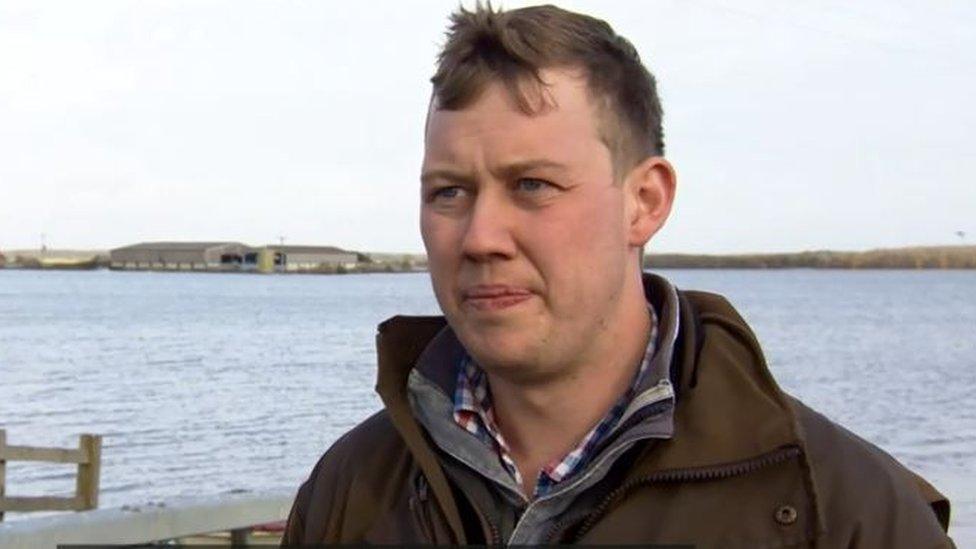Badly flooded Lincolnshire farmer 'not eligible' for government help
- Published
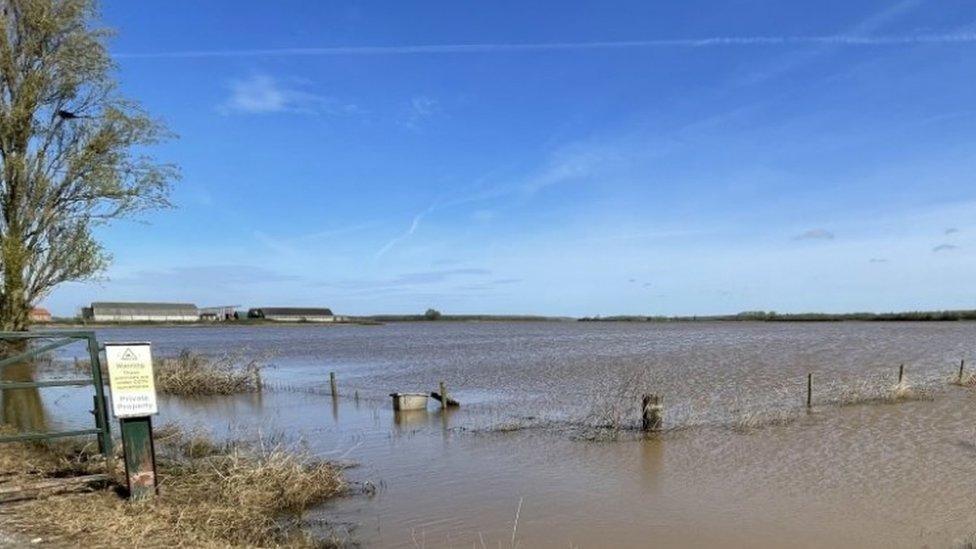
Henry Ward says hundreds of acres of his farm at Shortferry have been underwater for months
A farmer whose land has been underwater for months has spoken of his disbelief after being told he was not eligible to apply for a £25,000 government flood recovery grant.
Hundreds of acres at Henry Ward's farm at Shortferry - east of Lincoln - have been flooded since October.
Applications opened this week for farmers to apply for the cash.
The Department for Environment, Food and Rural Affairs (Defra) is 'looking at how it can expand the scheme'.
Mr Ward said he was told eligibility was dependent on a farm's proximity to a designated major river, meaning he did not qualify.
His farm was badly damaged in 2019 when the nearby Barlings Eau waterway broke its banks.
It was again left submerged following Storm Babet in October and further flooding from the Barlings Eau in January.
"We've been underwater for coming up to six months," Mr Ward said.
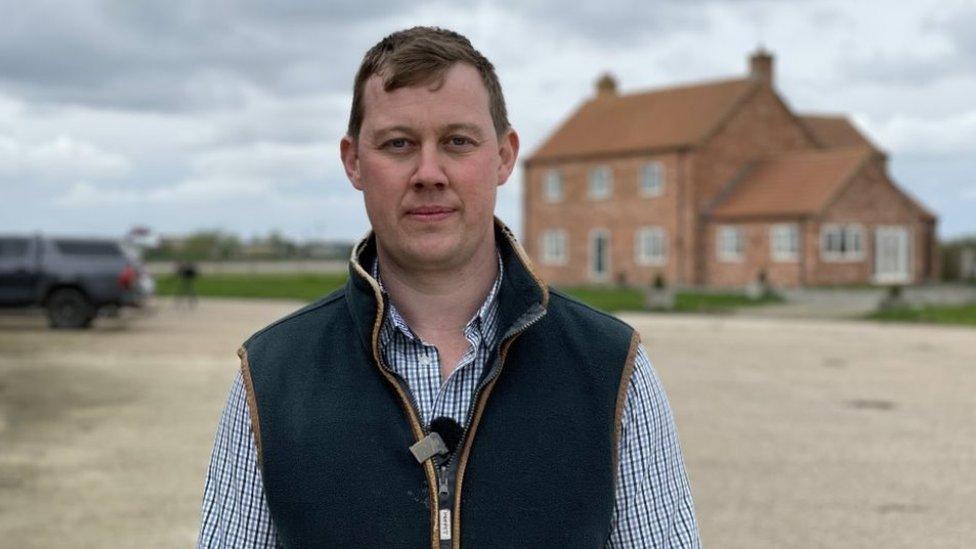
Mr Ward said he was told he was not eligible to apply for funding
The government first announced the fund in January and said it had consulted with stakeholders to develop eligibility criteria.
Qualifying rivers in Lincolnshire include the Witham, Welland and Nene.
However, Mr Ward said when he called the scheme's administrators he was told the Barlings Eau was not on the list of eligible rivers to claim against.
"It's just ridiculous," he said.
"If I'm not eligible then who on earth is?"
"I'm sure everyone is sick of seeing the pictures in the news as much as I am - but our farmhouse and yard is literally an island in the middle of a 500-acre lake," he added.
Mr Ward said he was more than £100,000 "out of pocket" due to the flooding, and had hoped to recoup some of his losses from the fund.
"I've been promised I will be getting a phone call to explain the situation - but, frankly, there is no explanation," he added.
Mr Ward is entitled to claim a maximum of £3,000 for a small piece of land away from the main farm that is close to the River Witham.
"If I'm not eligible for the full £25,000, I'd like to meet whoever is as they must be in the middle of the Atlantic somewhere," he said.
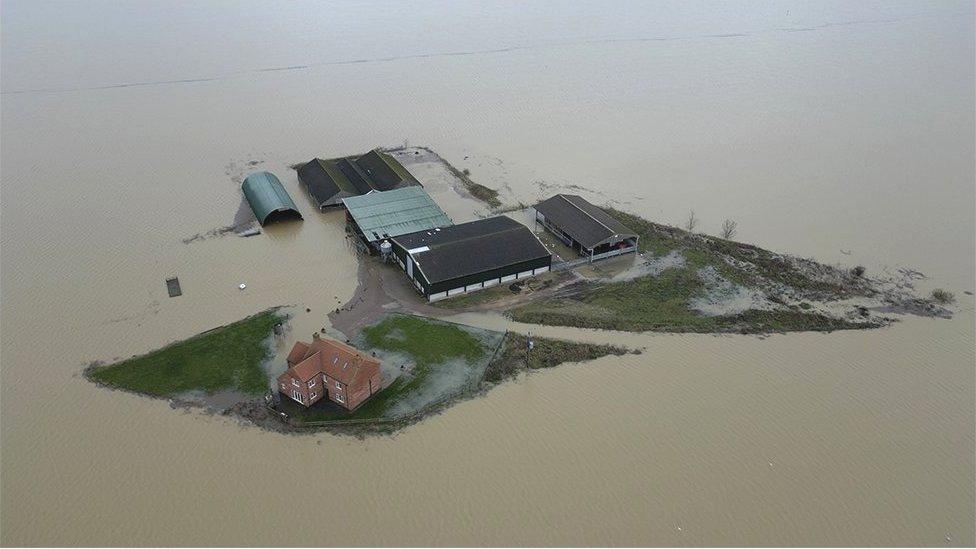
Archive aerial photograph showing flooding at Mr Ward's farm
A Defra spokesperson said: "The Farming Recovery Fund has been opened to support farmers who have suffered uninsurable damage to their land this winter.
"We have activated the initial phase of the scheme to ensure grants begin to reach farmers as quickly as possible, and are now looking at how we can expand the scheme to further areas and improve the support for those worst affected."
Mr Ward told BBC Radio Lincolnshire he was trying to laugh at the absurdity of the situation.
In a post on X (formerly Twitter), external, on Wednesday, he joked about letting out his farmhouse which he said is located on its "own private island" and has views of "the sea".

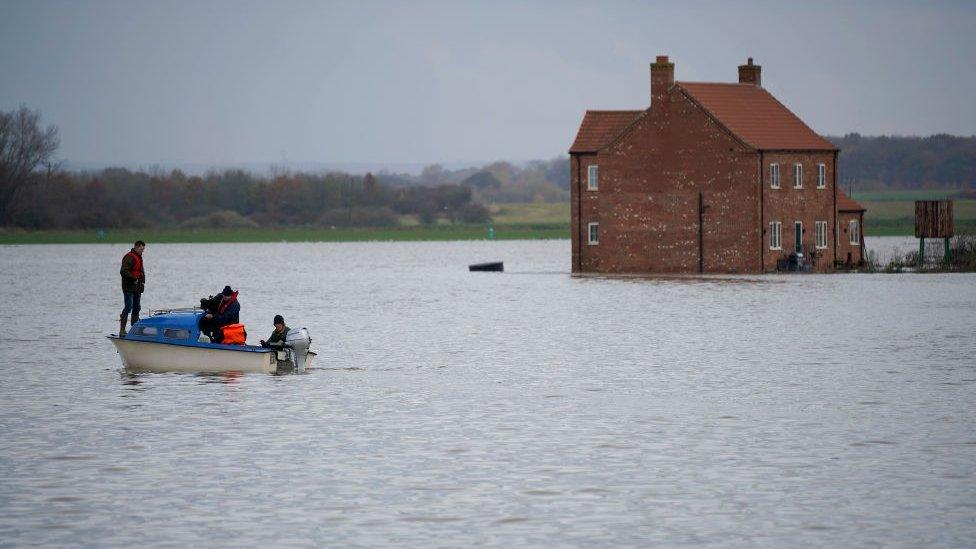
After being flooded in 2019, Mr Ward was forced to use a boat to access the family home
Analysis
By Paul Murphy, BBC East Yorkshire and Lincolnshire environment correspondent
Henry Ward is not hard to find. He is at the end of every internet search for 'flooded Lincolnshire farmer'. The images of his family farm, marooned in a lake of floodwater, have been seen around the world.
I first met Henry in 2019, the first time the banks of the Barlings Eau river were broken down by flooding. It was a surreal moment. Henry had needed to hastily buy a boat get to his farmhouse.
A two-minute journey by road now required careful navigation as we floated over fields and gates to reach barns filled with panicky sheep and the family home that sits alongside them. If Henry's land was not fully destroyed by the 2019 flood, it was certainly finished off when Storm Babet arrived last October. His fields have been under water ever since.
Soil once full of rich organic life, everything from earthworms to microbes, has been slowly drowning. It could take years for it to regain its growing power. The government's Flood Recovery Fund is offering up to £25,000 to flood stricken farmers. Even if Henry had qualified for it, this is a relatively small pot of money to a business where tractor tyres can cost £3,000 each. But Henry has not qualified for funding. The Defra spreadsheet has said 'no'.
A curious decision when this farm has been such a cause célèbe, attracting visits from MP's, government ministers and senior officials from the Environment Agency.
A farm, with its buildings at the centre of a large inland lake, has become emblematic of an industry where the forces of climate change become more dominant with every year. Farming can be a lonely business. And no one is feeling that more today than Henry Ward.

Farming Minster Mark Spencer said: "I know how difficult this winter has been for farmers, with extreme weather such as Storm Henk having a devastating impact on both cropping and grazing, as well as damaging property and equipment.
"The Farming Recovery Fund will support farmers who suffered uninsurable damage with grants of up to £25,000, and sits alongside broader support in our farming schemes to improve flood resilience," he added.

Follow BBC East Yorkshire and Lincolnshire on Facebook, external, X (formerly Twitter), external, and Instagram, external. Send your story ideas to yorkslincs.news@bbc.co.uk, external
- Published19 February 2024
- Published5 January 2024

- Published11 November 2019
